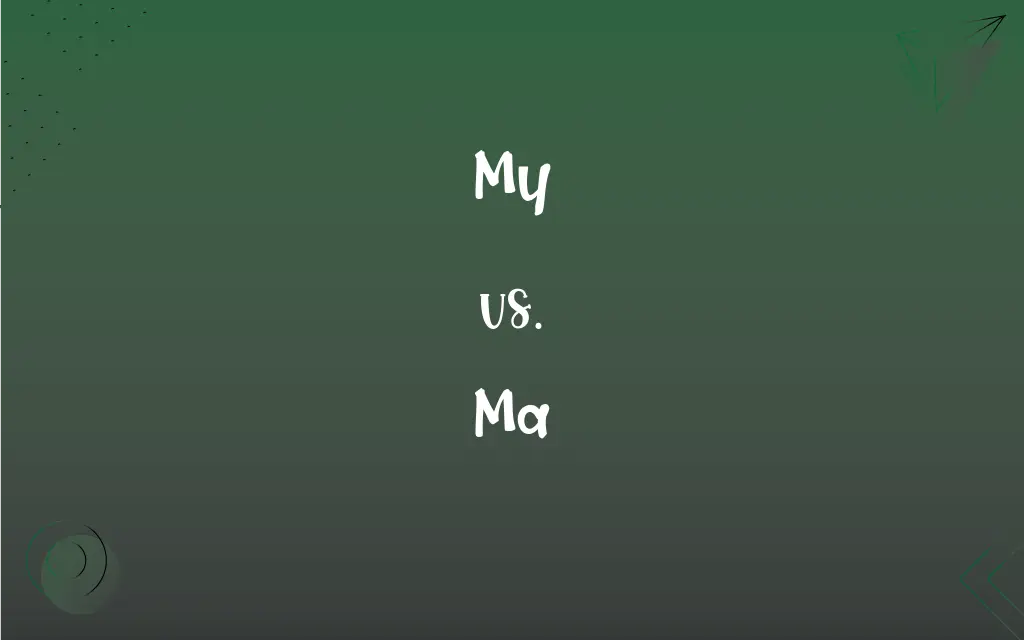My vs. Ma: What's the Difference?
By Janet White || Updated on May 23, 2024
"My" is an English possessive adjective used to show ownership, while "ma" is an informal term for mother in English or a French possessive adjective meaning "my" when referring to feminine nouns.

Key Differences
"My" is a possessive adjective in English used to indicate that something belongs to the speaker. For example, "my book" shows that the book belongs to the speaker. "My" is used with singular and plural nouns regardless of gender, making it versatile and straightforward in English grammar. "Ma" has two primary uses. In informal English, it is a colloquial term for mother, similar to "mom" or "momma." For example, "I need to call ma" indicates a need to call one's mother. In French, "ma" is a possessive adjective meaning "my," but it is specifically used with feminine singular nouns. For example, "ma maison" means "my house," where "ma" agrees with the feminine noun "maison."
The use of "my" is consistent in English, while "ma" changes in French based on the gender of the noun it modifies. This gender agreement is essential in French grammar but not applicable in English.
In English, "my" is always used to show possession, regardless of the noun's gender or number. On the other hand, in French, "ma" is only used for feminine singular nouns, with "mon" and "mes" used for masculine singular and plural nouns, respectively.
Both terms serve to show possession, but "my" is used in English without regard to gender, whereas "ma" in French specifically indicates feminine singular possession and also serves as a colloquial term for mother in English.
Comparison Chart
Language
English
French/Informal English
ADVERTISEMENT
Part of Speech
Possessive adjective
Possessive adjective (French) / Informal noun (English)
Usage
Shows ownership/possession
Shows ownership/possession (French) / Refers to mother (English)
Gender Agreement
No
Yes, feminine singular (French)
Example
"My book"
"Ma maison" (French: "my house") / "I need to call ma" (English: "mother")
My and Ma Definitions
My
Possessive adjective indicating ownership by the speaker.
My car is parked outside.
ADVERTISEMENT
Ma
French possessive adjective for feminine singular nouns.
Ma voiture est rouge. (My car is red.)
My
Does not change form based on gender or number.
This is my favorite shirt.
Ma
Informal term for mother in English.
I need to visit ma this weekend.
My
Shows personal relationship or possession.
My family lives nearby.
Ma
Indicates ownership or relation in French.
Ma sœur est étudiante. (My sister is a student.)
My
Used as a modifier before a noun
My boots.
My accomplishments.
Ma
Informal and affectionate in English context.
Ma always makes the best cookies.
My
Used preceding various forms of polite, affectionate, or familiar address
My friend, you are so right.
Ma
Mother.
My
Used in various interjectional phrases
My word! My goodness!.
Ma
Mother, mama
My
Used as an exclamation of surprise, pleasure, or dismay
Oh, my! What a tiring day!.
Ma
(colloquial) The landlady of a theater.
My
First-person singular possessive determiner. See Appendix:Possessive#English.
Ma
May
My
Belonging to me.
I can't find my book.
Ma
Alternative spelling of my
My
Associated with me.
My seat at the restaurant was uncomfortable.
Don't you know my name?
I recognised him because he had attended my school.
Ma
A child's word for mother.
My
Related to me.
My parents won't let me go out tonight.
Ma
In Oriental countries, a respectful form of address given to a woman; mother.
My
In the possession of me.
I have to take my books back to the library soon.
Ma
But; - used in cautionary phrases; as, "Vivace, ma non troppo presto" (i. e., lively, but not too quick).
My
Used to express surprise, shock or amazement.
My, what big teeth you have!
Ma
Informal terms for a mother
My
Of or belonging to me; - used always attributively; as, my body; my book; - mine is used in the predicate; as, the book is mine. See Mine.
Ma
A master's degree in arts and sciences
My
Used with both singular and plural nouns.
My friends are coming over.
Ma
One thousandth of an ampere
My
Common in formal and informal contexts.
My schedule is busy today.
Ma
A state in New England; one of the original 13 colonies
Ma
Changes based on noun's gender and number in French.
Ma maison est grande. (My house is big.)
FAQs
Is "my" gender-specific?
No, "my" is not gender-specific and can be used with any noun.
What does "ma" mean in French?
In French, "ma" is a possessive adjective meaning "my" used with feminine singular nouns.
What does "my" mean?
"My" is a possessive adjective in English showing ownership by the speaker.
Can "ma" be used for masculine nouns in French?
No, "ma" is only used for feminine singular nouns. For masculine singular, "mon" is used.
Can "ma" be plural?
No, in French, the plural possessive adjective is "mes."
What does "ma" mean in English?
In informal English, "ma" refers to one's mother.
What is the masculine equivalent of "ma" in French?
The masculine equivalent is "mon."
How do you use "ma" in a French sentence?
E.g., Ma chambre est propre. (My room is clean.)
What is the possessive adjective for masculine nouns in French?
"Mon."
Is "ma" ever used for plural nouns in French?
No, "mes" is used for plural nouns.
How do you use "my" in a sentence?
E.g., My dog loves to play fetch.
Is "my" used in formal writing?
Yes, "my" is appropriate for both formal and informal writing.
How do you say "my mother" in French?
Ma mère.
Is "ma" commonly used in formal English?
No, "ma" is informal and usually used in casual conversation.
Is "ma" affectionate in English?
Yes, it is often used affectionately.
Does "my" change form in different contexts?
No, "my" remains the same.
Can "my" be used for objects?
Yes, e.g., My phone is new.
How do you refer to a group possession in English?
Using "our," but "my" for individual possession.
Is "ma" used in formal French?
Yes, but only for feminine singular nouns.
How do you address your mother in French using "ma"?
E.g., Ma mère, je t’aime. (My mother, I love you.)
About Author
Written by
Janet WhiteJanet White has been an esteemed writer and blogger for Difference Wiki. Holding a Master's degree in Science and Medical Journalism from the prestigious Boston University, she has consistently demonstrated her expertise and passion for her field. When she's not immersed in her work, Janet relishes her time exercising, delving into a good book, and cherishing moments with friends and family.































































